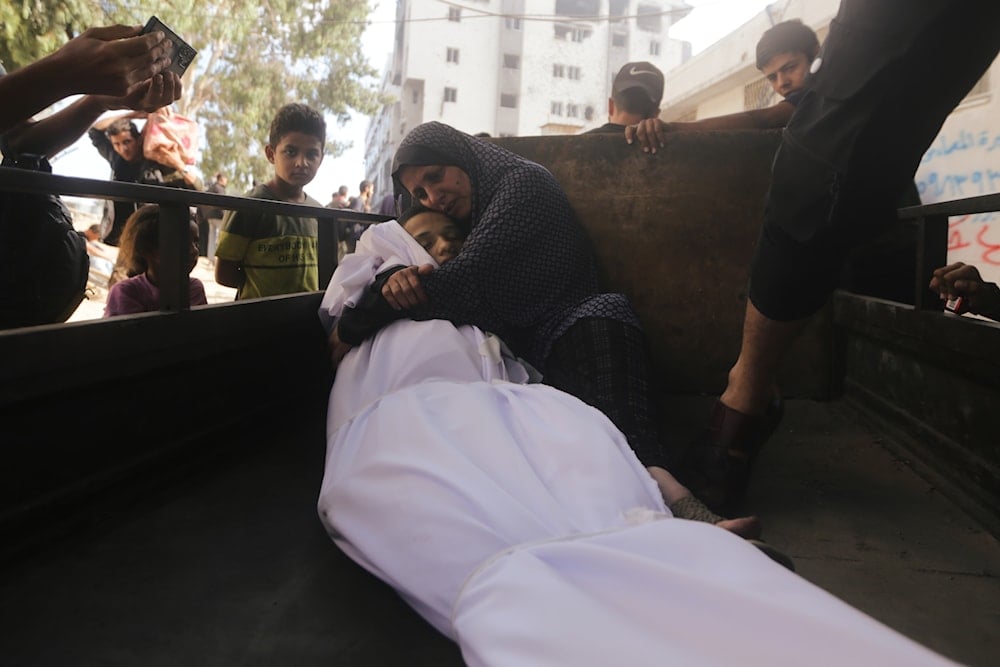‘We don’t feel safe’: Hope crushed as ‘Israel’ resumes Gaza killings
"Israel" violates the Gaza ceasefire once again, killing over 100 Palestinians in 24 hours as Palestinians denounce the truce as a deadly illusion.
-

Palestinian mother mourns her child killed in an Israeli army strike, at Shifa Hospital in Gaza City, Wednesday, Oct. 29, 2025. (AP)
When the ceasefire in Gaza was announced, Ameen al-Zein felt, for the first time in years, that "peace" might be within reach. On Tuesday night, the 42-year-old gave an interview to a local NGO, urging forcibly displaced families to return to their homes in northern Gaza now that the Israeli war had stopped. Half an hour later, Zein was killed in a brutal Israeli airstrike on the Beit Lahia school where he had been sheltering, The Guardian reported.
He had promised his wife, Maryam, that they would go back to Beit Lahia and pitch a tent over the rubble of their destroyed home, if only to be together on their land again.
“When the truce was declared, Abu Luay felt relieved and hopeful,” Maryam said, using his family nickname. “He believed the bloodshed was finally over. Sadly, that feeling didn’t last. Israel violated the ceasefire again.”
Zein was among 115 Palestinians killed and more than 350 wounded during 24 hours of Israeli bombardment this week, according to Gaza’s Health Ministry.
It was the deadliest day since the ceasefire came into effect on October 10, and one of the bloodiest since the Israeli genocide began two years ago.
'Israel' continues to shatter the ceasefire
The renewed strikes have deepened fear and skepticism, where people in Gaza now see the ceasefire as an illusion, a lull punctuated by unpredictable Israeli killings.
Many worry that this “peace” will mirror Lebanon’s, under which Israeli airstrikes continue to kill civilians almost daily despite a year-old agreement.
Hussain Abu Munir, a 40-year-old nurse, experiences that uncertainty each day on his commute between southern and northern Gaza. Forcibly displaced with his family, he still travels north with other medical staff to work, a journey he describes as “a daily gamble with death.”
“To gather in a bus full of medical workers feels unsafe. So many of us were killed during the war,” said Abu Munir, referring to the 1,722 healthcare workers who lost their lives, according to Medical Aid for Palestine.
Crossing the Netzarim checkpoint, he told The Guardian, is the most nerve-racking part of the journey. “Every day we go and return, it feels like embarking on a dangerous, uncertain journey. My biggest fear isn’t for myself but for my children in the south, that the checkpoint will close before I can come home.”
On Wednesday, as his bus approached Netzarim, Israeli shells began landing nearby. “People screamed for the driver to stop,” he recalled. “We made it through unharmed, but no one can promise we’ll be safe tomorrow.”
Doubts over international guarantees
Despite the rising toll, international mediators have insisted that the ceasefire remains intact. US President Donald Trump said nothing would “jeopardize the truce,” while Vice President JD Vance dismissed the bombings as mere “skirmishes", despite being one-sided. Hours later, "Israel" launched another strike, killing more Palestinians, including women and children.
For people in Gaza, those reassurances ring hollow. “We’ve lived this pattern before,” said Ikram Nasser, a 36-year-old English teacher. “They say it’s a ceasefire, but we’re still hearing explosions.”
Children’s futures on hold
Nasser had hoped the truce would allow schools to reopen and restore some normalcy for Gaza’s children. After two years of genocide, she has watched her students become withdrawn, anxious, and often aggressive, symptoms, she said, of trauma and deprivation.
“These children don’t play anymore. They chase after food distributions and water tankers,” she stressed. “Their childhoods have been replaced by survival.”
In the first days of the ceasefire, makeshift classrooms reopened in tents, and children began lining up again, some arriving as early as seven in the morning, eager to learn.
But this week’s bombings have shattered that fragile hope. “Even now, we don’t feel safe,” Nasser said. “Every day brings new violations. As mothers and as teachers, we no longer trust the ceasefire will hold.”
Read more: ‘The hardest loss is education’: Gaza’s children tell their stories

 4 Min Read
4 Min Read











